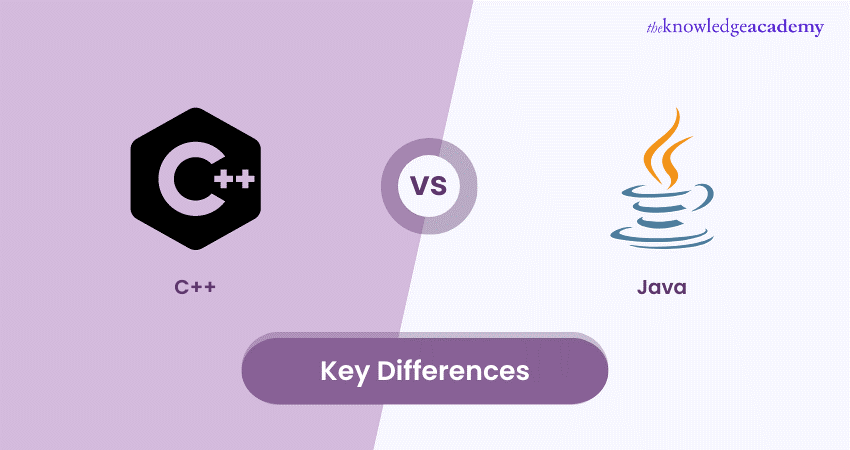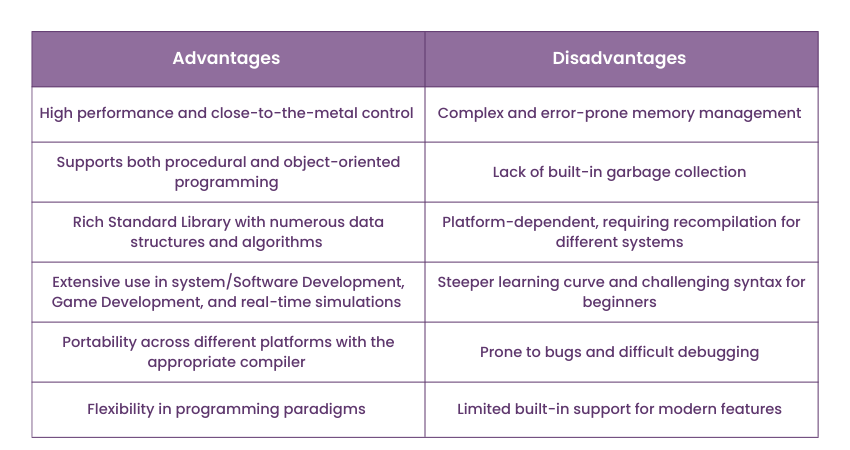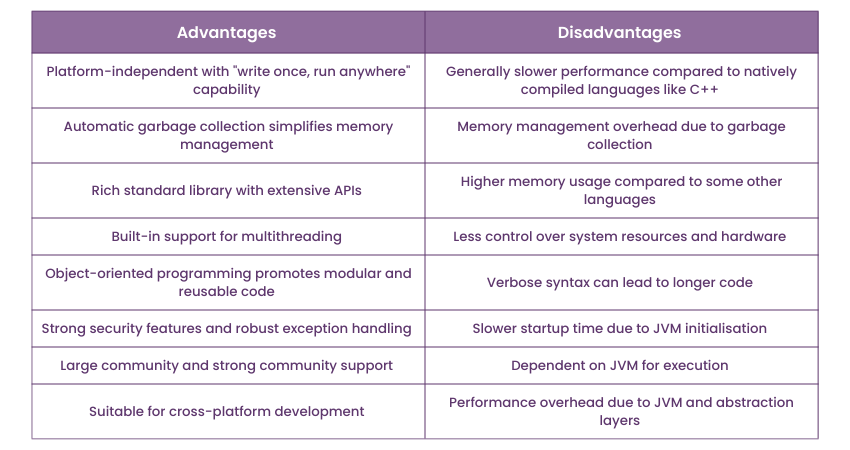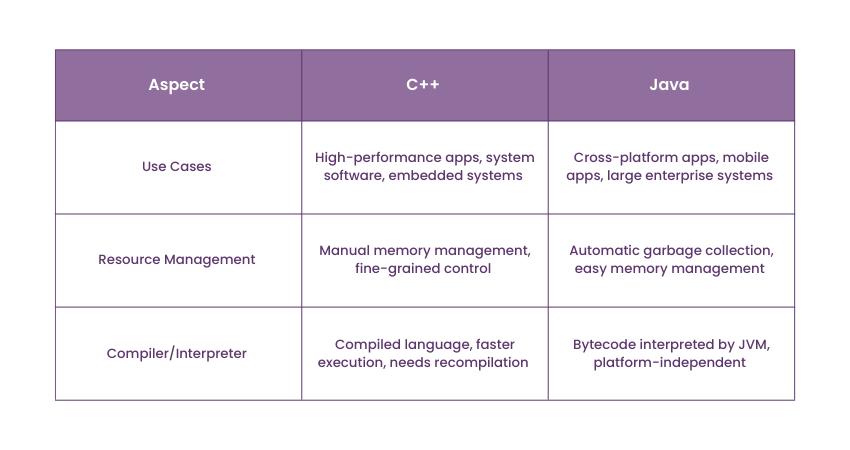We may not have the course you’re looking for. If you enquire or give us a call on +61 1-800-150644 and speak to our training experts, we may still be able to help with your training requirements.
Training Outcomes Within Your Budget!
We ensure quality, budget-alignment, and timely delivery by our expert instructors.

When diving into the world of programming languages, you often encounter the two giants: C++ and Java. Each language has carved out its niche, offering distinctive advantages that cater to different aspects of Software Development. But have you ever thought about what really distinguishes them? In this exploration of the Difference Between C++ and Java, we'll uncover the key distinctions that make each language a powerhouse in its own right.
C++ and Java, though rooted in C, have evolved into unique languages with their own philosophies and problem-solving approaches. So, which language should you learn or use for your upcoming project? Let's delve into the Difference Between C++ and Java to help you make an informed decision and enhance your programming skills.
Table of Contents
1) C++ as a Language
2) Java as a Language
3) Features of C++ Language
4) Features of Java Language
5) Advantages and Disadvantages of C++
6) Advantages and Disadvantages of Java
7) Java vs C++: Syntax Comparison
8) Differences Between C++ and Java
9) C++ or Java: Which is the Better Choice?
10) Conclusion
C++ as a Language
C++ is a robust and flexible programming language extensively utilised in applications ranging from Game Development to system programming. Developed by Bjarne Stroustrup in 1983, it extends the C language by integrating object-oriented features, making it a hybrid language suitable for both procedural and Object-Oriented Programming (OOP).
Its capabilities include dynamic memory management and low-level manipulation. Additionally, it features a comprehensive Standard Template Library (STL), enabling efficient data management and high-performance application development.
Java as a Language
Java is a widely used, object-oriented programming language designed for portability, security, and robustness. Created by James Gosling at Sun Microsystems in 1995, Java enables developers to write code once and run it anywhere (WORA), thanks to the Java Virtual Machine (JVM).
Its key features include automatic memory management, a rich standard library, and strong community support. Java is used in web development, mobile apps, and enterprise systems, making it versatile for various programming needs.
Become a proficient Java developer with our comprehensive Java Courses - start your journey towards coding excellence today!
Features of C++ Language
C++ is a powerful programming language with numerous features that make it versatile and efficient for various types of Software Development. Here are some key features that highlight its capabilities:
Simple and User-friendly
C++ is designed to be straightforward, building on the familiar syntax of C. This familiarity makes it accessible for developers with C experience, enabling them to develop complex programs with relative ease. Its straightforward approach enhances efficiency and reduces the learning curve for new programmers.
Object-oriented Programming
C++ supports object-oriented programming, incorporating principles like encapsulation, inheritance, polymorphism, and abstraction. These features promote modular and reusable code, facilitating the management and maintenance of large and complex software projects. OOP principles help organise code into manageable, logical sections, improving overall software design and development.
Platform Dependent
C++ is platform-dependent, meaning programs written in C++ must be recompiled for each target platform. This recompilation allows developers to optimise performance for specific hardware and operating systems. As a result, applications run efficiently on various devices and configurations.
Static Lambda Function
C++ supports static lambda functions, which are anonymous functions that can capture variables from their surrounding scope. These functions allow developers to create concise, on-the-fly function objects. This enhances code clarity and flexibility, streamlining the coding process by eliminating the need for separate named function definitions.
Structured Programming Language
C++ encourages structured programming by promoting the division of programs into functions or modules. This structured approach enhances readability, maintainability, and organisation, making complex software systems easier to debug, understand, and modify.
Mid-level Programming Language
C++ is a mid-level programming language, bridging the gap between high-level and low-level programming. It provides high-level abstractions for complex tasks while also allowing for low-level memory manipulation, offering both flexibility and control.
Rich Library
C++ includes a rich library of inbuilt functions, such as push and pop, which are generic and implementable for any data type. Here are some key libraries:
1) Vector:
A dynamic array capable of resising upon insertion or deletion of elements. Elements are stored contiguously, making access and traversal efficient. Defined with ‘std::vector’ in the header file.
2) Queue:
A container is adaptor operating on a First-In-First-Out (FIFO) basis. Elements are added at the end and removed from the front, using underlying containers like deque or list.
3) Stack:
A container adaptor is operating on a Last-In-First-Out (LIFO) basis. Elements are added and removed from the same end. Utilises vector, deque, or list as foundational containers.
4) Set:
An associative container where each element is unique and stored in a sorted order. Sets support ordered subset iterations and are typically implemented using binary search trees.
5) Multiset:
An associative container allows multiple equivalent values. Elements are sorted based on a comparison function. Efficient for operations like search, insert, and delete, typically in logarithmic time.
6) Unordered Set:
An associative container using a hash table for storage, ensuring random insertion. Offers average constant-time performance for lookups, with unique keys and efficient operations defined in the header file.
7) Map:
An associative container storing elements as key-value pairs with unique keys. Common operations include insertion, deletion, and access, defined using the ‘std::map’ class template. Key functions include ‘begin()’, ‘end()’, ‘size()’, ‘insert()’, ‘erase()’, and ‘clear()’.
Case-sensitive
C++ is case-sensitive, treating uppercase and lowercase letters as distinct. This means that variable names such as ‘Variable’ and ‘variable’ are considered different, which can help prevent naming conflicts and errors in the code.
Dynamic Memory Allocation
C++ allows dynamic memory allocation, enabling developers to allocate and deallocate memory at runtime using pointers. This feature provides flexibility in managing memory usage, which is crucial for developing high-performance applications.
Templates Creation
C++ supports the creation of templates, facilitating generic programming. Templates enable functions and classes to operate with any data type, promoting code reuse and reducing redundancy, leading to more efficient and maintainable code.
Elevate your programming expertise by mastering C with our C++ Programming (C Plus Plus) Course designed for both beginners and professionals!
Features of Java Language
Java is a robust and versatile programming language known for its platform independence, efficient memory management, and support for multithreading. Here are some key features that make Java a popular choice among developers:
Platform Independent
Java is platform-independent due to its "write once, run anywhere" capability. Java programs are converted into bytecode, which can be run on any hardware that has the Java Virtual Machine. This ensures cross-platform compatibility, allowing the same program to run on different operating systems without the need for recompilation.
Automatic Garbage Collection
Java features automatic garbage collection; it maintains memory by continuously recovering memory occupied by objects that are no longer in use. This process reduces the risk of memory leaks and simplifies memory management for developers, as they do not need to manually handle memory allocation and deallocation.
Object-oriented Programming Language
Java is an object-oriented programming language that promotes principles such as encapsulation, inheritance, polymorphism, and abstraction. These features enable developers to create modular, reusable, and maintainable code, promoting better software design and development practices.
Multithreading
Java supports multithreading, allowing multiple threads to run concurrently within a single program. This capability enhances the performance of applications by making efficient use of CPU resources and enabling smoother execution of complex tasks.
Memory Management System
Java's memory management system includes a heap area for dynamic memory allocation and a stack area for static memory allocation. The JVM manages memory allocation and deallocation automatically, improving application stability and reducing the complexity of memory management for developers.
Enhance your coding skills with an expert-led Java Programming Course – start your journey with us now!
Advantages and Disadvantages of C++
Below is a table highlighting the various advantages and disadvantages of C++:

Start mastering the C Programming Language with our comprehensive C# Programming (C Sharp) Course and boost your professional skills today!
Advantages and Disadvantages of Java
Below is a table highlighting the various advantages and disadvantages of Java:

Learn JavaScript from scratch with our JavaScript For Beginners Course – sign up today!
Java vs C++: Syntax Comparison
Java and C++ were both inspired by C, and as a result, they follow a similarity in their programming structure. They both follow the concept of OOP, but their similarities end there. Both languages have evolved very differently and use different syntaxes as a result.
Example 1.
|
C++ |
Java |
|
#include int main() { std::cout << "The Knowledge Academy" << std::endl; return 0; } |
public class Main { public static void main(String[] args) { System.out.println("The Knowledge Academy"); } } |
|
Output: The Knowledge Academy |
Output: The Knowledge Academy |
Example 2.
Let's see another program that will show how both languages differ in using Input and Output statements. Once again, C++ could print a statement without declaring a class.
|
C++ |
Java |
|
#include int main() { std::string name; std::cout << "Enter your name: "; std::cin >> name; std::cout << "Hello, " << name << "! Welcome to The Knowledge Academy." << std::endl; return 0; } |
import java.util.Scanner; public class Main { public static void main(String[] args) { Scanner scanner = new Scanner(System.in); System.out.print("Enter your name: "); String name = scanner.nextLine(); System.out.println("Hello, " + name + "! Welcome to The Knowledge Academy."); scanner.close(); } } |
|
Output: Enter your name: Developer Hello, Developer! Welcome to The Knowledge Academy. |
Output: Enter your name: Developer Hello, Developer! Welcome to The Knowledge Academy. |
Differences Between C++ and Java
The following are the differences between C++ and Java:
|
Feature |
C++ |
Java |
|
Platform Independence |
Platform-dependent, requires recompilation for different OS |
Write once, run anywhere with JVM |
|
Memory Management |
Manual memory management with pointers |
Automatic garbage collection |
|
Syntax and Paradigm |
Supports both procedural and object-oriented programming |
Purely object-oriented |
|
Performance |
Generally faster, compiled to native code |
Slower due to JVM overhead |
|
Pointers |
Supports direct pointer manipulation |
No direct pointer manipulation |
|
Multiple Inheritance |
Supported with classes |
Not supported, uses interfaces |
|
Libraries and APIs |
Standard Template Library and Boost |
Rich standard libraries and APIs |
|
Exception Handling |
Optional exception handling |
Mandatory exception handling |
|
Concurrency |
Supports multithreading, but more complex |
Built-in support with multithreading |
|
Compilation |
Compiled directly to machine code |
Compiled to bytecode, then interpreted by JVM |
Unlock your potential with our comprehensive Web Development Using Java Training – register now for expert guidance!
C++ or Java: Which is the Better Choice?
Choosing between C++ and Java depends on various factors, including the use case, resource management needs, and how each language handles compilation and interpretation. Here is a detailed comparison to help determine which might be the better choice in different scenarios:

1) Use Cases
C++ is better for high-performance applications, system software, and embedded systems where low-level hardware access and manual memory management are crucial.
Java is better for cross-platform applications, mobile apps (especially Android), and large-scale enterprise systems where platform independence and ease of development are important.
2) Resource Management
C++ excels in fine-grained control over memory and system resources, making it suitable for performance-critical applications.
Java offers automatic garbage collection, simplifying memory management and reducing the risk of memory leaks, which is beneficial for ease of use and reducing development errors.
3) Compiler and Interpreter
C++ is a compiled language, leading to faster execution times and better performance, but it requires platform-specific recompilation.
Java uses bytecode interpreted by the JVM, providing platform independence and ease of cross-platform development, though with some performance overhead.
Conclusion
Mastering the Difference Between C++ and Java is key to informed Software Development. C++ dazzles with performance and control, while Java impresses with platform independence and simplicity. By understanding these nuances, you can choose the perfect language for your project, ensuring optimal efficiency and success in your coding endeavours.
Master C Programming with our detailed C Programming Course and enhance your coding skills for better career opportunities!
Frequently Asked Questions

The choice between C++ and Java depends on your project needs: C++ offers high performance and control for system-level programming, while Java provides platform independence and ease of use for cross-platform and enterprise applications.

Java and C++ share some features, like object-oriented programming, but they differ significantly. C++ offers low-level memory control and performance. Java excels in platform independence, automatic memory management, and ease of use.

The Knowledge Academy takes global learning to new heights, offering over 30,000 online courses across 490+ locations in 220 countries. This expansive reach ensures accessibility and convenience for learners worldwide.
Alongside our diverse Online Course Catalogue, encompassing 17 major categories, we go the extra mile by providing a plethora of free educational Online Resources like News updates, Blogs, videos, webinars, and interview questions. Tailoring learning experiences further, professionals can maximise value with customisable Course Bundles of TKA.

The Knowledge Academy’s Knowledge Pass, a prepaid voucher, adds another layer of flexibility, allowing course bookings over a 12-month period. Join us on a journey where education knows no bounds.

The Knowledge Academy offers various C Programming Training, including C++ Programming (C Plus Plus), C Programming, C# Programming (C Sharp) and Introduction of Embedded C Programming. These courses cater to different skill levels, providing comprehensive insights into C vs Java.
Our Programming and DevOp Blogs cover a range of topics related to Java and C++, offering valuable resources, best practices, and industry insights. Whether you are a beginner or looking to advance your Java Programming skills, The Knowledge Academy's diverse courses and informative blogs have you covered.
Upcoming Programming & DevOps Resources Batches & Dates
Date
 C++ Programming (C Plus Plus)
C++ Programming (C Plus Plus)
Thu 23rd Jan 2025
Thu 27th Mar 2025
Thu 15th May 2025
Thu 17th Jul 2025
Thu 25th Sep 2025
Thu 13th Nov 2025







 Top Rated Course
Top Rated Course



 If you wish to make any changes to your course, please
If you wish to make any changes to your course, please


